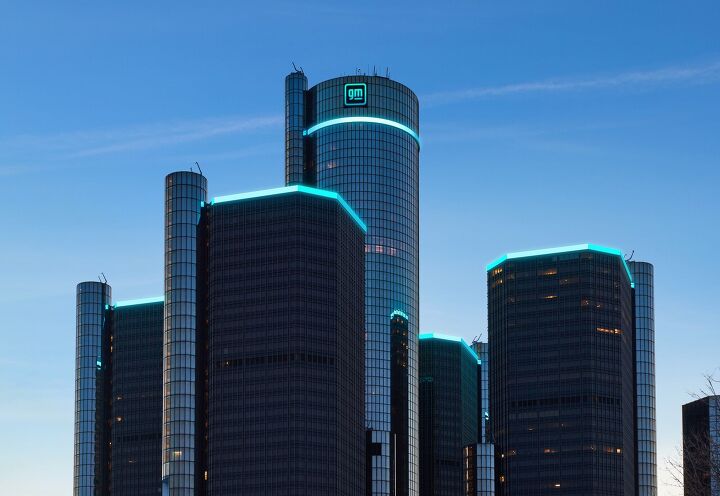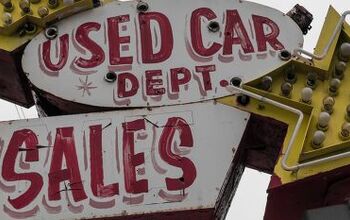GM Says Updated U.S. Emissions Rules Will Cost Auto Industry Billions in Fines

The National Highway Traffic Safety Administration (NHTSA) will soon release its proposal to increase Corporate Average Fuel Efficiency (CAFE) requirements and General Motors has signaled its concerns regarding how much more money it will cost the automotive industry. GM is estimating that the new rules could result in manufacturers paying $100-300 billion in emission fines between 2027 and 2031.
However, the Biden administration has reportedly said it’s highly dependent on which plan is implemented — suggesting industry penalties would vary heavily between companies and average out to be far lower than GM has claimed.
According to Reuters, GM executive David Strickland met with White House Office of Management and Budget officials on July 17th to discuss the matter. This was verified via information found on the White House website.
During the meeting, GM estimated the auto industry as a whole could see penalties ranging from $1,300 to $4,300 per vehicle by 2031. While the final tally would depend on whether a proposal from the Energy Department to revise the petroleum-equivalent fuel economy rating for electric vehicles is enacted, the company remained concerned that fines would still total in the hundreds of billions.
The Biden administration refuted the claims by suggesting that “under one scenario the auto industry could face about $3 billion in fuel economy penalties in 2032 and in another it might face essentially no penalties.”
From Reuters:
Another official told Reuters NHTSA's preferred CAFE proposal is estimated to save consumers more than $50 billion on fuel over a vehicles' lifetime and reduce oil use by more than 88 billion gallons through 2050. Overall, the benefits of the rule would exceed costs by more than $18 billion, the official added.
GM, which in 2021 vowed to halt the sale of new gasoline-powered vehicles by 2035, said this month it could face compliance challenges under the EV efficiency rules and vehicle emissions regulations. The company said on Thursday it looks forward to "further and increased technical dialogue with the EPA and the White House as the rule is finalized."
NHTSA's plan will follow the Environmental Protection Agency's April proposal to toughen 2027-2032 standards, requiring a 56 percent emissions cut that would result in 67 percent of new vehicles by 2032 being EVs.
And they say there’s no such thing as EV mandates.
The automotive lobby has been vehemently against the updated emission requirements. They want the EPA to ease off and have called the proposed targets unreasonable and impossible to achieve in the time allotted.
We’ve also seen just how much some corners of the industry have had to pay out thus far. Reuters referenced a June report that estimated Stellantis and GM paid a total of $363 million in civil penalties for failing to meet CAFE requirements for prior model years. Of course, automakers (particularly Stellantis when it was still Fiat Chrysler) also shelled out millions to purchase carbon credits in an effort to avoid government-backed fines.
Other than trying to game today’s CAFE requirements by exploiting regulatory loopholes that allow automakers to build increasingly large vehicles with subpar fuel economy ( we covered this in a recent article), the industry’s only recourse is to prioritize building all-electric vehicles and/or focus on putting smaller, hyper-efficient engines into current lineups.
Unfortunately, EV adoption rates haven’t kept pace with the industry’s initial assumptions and manufacturers are worried economical powertrains won’t deliver useful amounts of power or reliability on some of the larger models Americans tend to prefer. Otherwise, they’re going to continue battling to see who can buy up the most carbon offsets before they run out (which arguably does little to help the environment) or prepare to hand a sizable amount of cash to the federal government every year.
[Image: General Motors]
Become a TTAC insider. Get the latest news, features, TTAC takes, and everything else that gets to the truth about cars first by subscribing to our newsletter.

A staunch consumer advocate tracking industry trends and regulation. Before joining TTAC, Matt spent a decade working for marketing and research firms based in NYC. Clients included several of the world’s largest automakers, global tire brands, and aftermarket part suppliers. Dissatisfied with the corporate world and resentful of having to wear suits everyday, he pivoted to writing about cars. Since then, that man has become an ardent supporter of the right-to-repair movement, been interviewed on the auto industry by national radio broadcasts, driven more rental cars than anyone ever should, participated in amateur rallying events, and received the requisite minimum training as sanctioned by the SCCA. Handy with a wrench, Matt grew up surrounded by Detroit auto workers and managed to get a pizza delivery job before he was legally eligible. He later found himself driving box trucks through Manhattan, guaranteeing future sympathy for actual truckers. He continues to conduct research pertaining to the automotive sector as an independent contractor and has since moved back to his native Michigan, closer to where the cars are born. A contrarian, Matt claims to prefer understeer — stating that front and all-wheel drive vehicles cater best to his driving style.
More by Matt Posky
Latest Car Reviews
Read moreLatest Product Reviews
Read moreRecent Comments
- GregLocock Car companies can only really sell cars that people who are new car buyers will pay a profitable price for. As it turns out fewer and fewer new car buyers want sedans. Large sedans can be nice to drive, certainly, but the number of new car buyers (the only ones that matter in this discussion) are prepared to sacrifice steering and handling for more obvious things like passenger and cargo space, or even some attempt at off roading. We know US new car buyers don't really care about handling because they fell for FWD in large cars.
- Slavuta Why is everybody sweating? Like sedans? - go buy one. Better - 2. Let CRV/RAV rust on the dealer lot. I have 3 sedans on the driveway. My neighbor - 2. Neighbors on each of our other side - 8 SUVs.
- Theflyersfan With sedans, especially, I wonder how many of those sales are to rental fleets. With the exception of the Civic and Accord, there are still rows of sedans mixed in with the RAV4s at every airport rental lot. I doubt the breakdown in sales is publicly published, so who knows... GM isn't out of the sedan business - Cadillac exists and I can't believe I'm typing this but they are actually decent - and I think they are making a huge mistake, especially if there's an extended oil price hike (cough...Iran...cough) and people want smaller and hybrids. But if one is only tied to the quarterly shareholder reports and not trends and the big picture, bad decisions like this get made.
- Wjtinfwb Not proud of what Stellantis is rolling out?
- Wjtinfwb Absolutely. But not incredibly high-tech, AWD, mega performance sedans with amazing styling and outrageous price tags. GM needs a new Impala and LeSabre. 6 passenger, comfortable, conservative, dead nuts reliable and inexpensive enough for a family guy making 70k a year or less to be able to afford. Ford should bring back the Fusion, modernized, maybe a bit bigger and give us that Hybrid option again. An updated Taurus, harkening back to the Gen 1 and updated version that easily hold 6, offer a huge trunk, elevated handling and ride and modest power that offers great fuel economy. Like the GM have a version that a working mom can afford. The last decade car makers have focused on building cars that American's want, but eliminated what they need. When a Ford Escape of Chevy Blazer can be optioned up to 50k, you've lost the plot.


































Comments
Join the conversation
Get good GM
Just thing, because the radical left pushing their climate change hoax inorder to control every aspect of our lives we will all be paying A LOT more for everything. I just wander what it will take for my fellow Americas to wake up and understand this. And if you think I'm wrong look around, it's already happening everywhere.